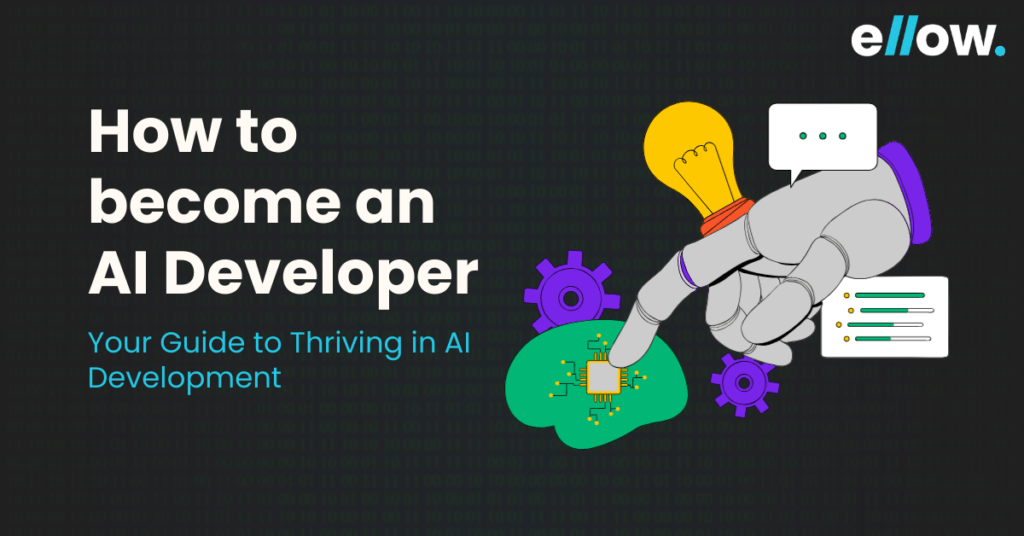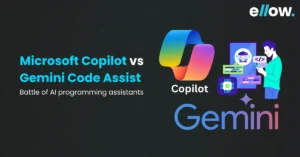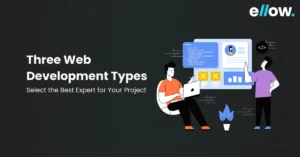Artificial intelligence (AI) stands out as one of the most dynamic and influential areas of innovation. With advancements like voice assistants such as Siri and Alexa, and the proliferation of chatbots like ChatGPT, and Google’s Gemini, AI’s impact on various industries continues to expand.
Predictions suggest that by 2025, the global AI market could exceed $190 billion, highlighting the immense potential and demand for skilled professionals in this field.
This article will explore the journey to becoming an AI developer, a role at the forefront of innovation and problem-solving. We will delve into the responsibilities of AI developers and outline the essential steps you can take to embark on this exciting career path.
What Is Artificial Intelligence?
Artificial Intelligence (AI) refers to the capability of computer systems to imitate human behavior. Unlike traditional programs, AI enables machines to learn from past experiences and improve over time.
Just like how humans and animals demonstrate natural intelligence, machines with AI can perform tasks in ways that resemble human cognition.
In AI, machines analyze past data and actions, learning from both positive and negative outcomes. This knowledge allows them to adjust themselves to avoid repeating mistakes and handle new inputs more effectively. Eventually, AI-powered machines can perform tasks that typically require human-like understanding and decision-making abilities.
“Whenever I hear people saying AI is going to hurt people in the future I think, technology can generally always be used for good and bad and you need to be careful about how you build it. If you’re arguing against AI, then you’re arguing against safer cars that aren’t going to have accidents, and you’re arguing against being able to better diagnose people when they’re sick.” ~Mark Zuckerberg
Who is an AI Developer?
An AI Developer is someone who specializes in creating artificial intelligence software and applications for various industries. They focus on developing intelligent systems that can perform tasks autonomously or with minimal human intervention. This involves working on a range of areas, from natural language processing to robotics.
In their role, an AI Developer designs and deploys AI models, utilizing programming languages such as R, Java, and Python to build software. They also analyze data to improve machine learning models, ensuring that the AI systems they develop are effective and efficient.
Moreover, an AI Developer is responsible for communicating complex AI concepts to stakeholders and project managers, helping them understand the capabilities and potential applications of AI technology.
To become an AI Developer, one typically needs a strong background in computer science, mathematics, and programming. Skills such as problem-solving, critical thinking, and creativity are also essential for success in this field.
What is the role of an AI Developer?
An AI developer is a crucial member of a team tasked with harnessing the power of artificial intelligence to solve complex problems and improve processes. Their role involves understanding problems, identifying solutions, and developing technological solutions to address those problems efficiently.
1. Understanding problems
At the core of an AI developer’s responsibilities lies the ability to comprehend the challenges and obstacles faced by businesses or industries.
By thoroughly grasping the nature of the problem at hand, an AI developer can effectively leverage artificial intelligence to devise viable solutions. This understanding extends beyond surface-level issues to encompass nuances, constraints, and specific requirements.
2. Identifying solutions
With a comprehensive understanding of the problem, an AI developer embarks on the task of pinpointing optimal solutions. This involves analyzing various factors such as available data, existing technologies, and potential approaches to find the most suitable path forward.
Through critical thinking and strategic evaluation, an AI developer identifies solutions that promise to deliver tangible benefits and address the underlying problem effectively.
3. Developing technological solutions
Once a viable solution is identified, an AI developer translates concepts into tangible technological solutions. This often involves designing and implementing machine learning models, algorithms, or prototype applications tailored to the specific problem domain.
Leveraging programming languages such as Python, Java, or C++, an AI developer brings these solutions to life, ensuring they align with the objectives and requirements outlined.
Types of an AI Developer
Here are some roles within the AI development field:
1. Machine Learning Engineer
Machine learning engineers are pivotal in AI projects, leveraging their expertise in applied research and data science. They possess strong programming skills and a deep understanding of various programming languages. Their role involves developing and implementing machine learning algorithms to enable systems to learn and improve from experience.
2. Data Scientist
Data scientists are responsible for gathering, analyzing, and interpreting large and intricate datasets using machine learning and predictive analytics techniques. They contribute significantly to creating algorithms for data collection and cleansing, ensuring high-quality data for analysis. Data scientists play a crucial role in deriving valuable insights and making data-driven decisions.
3. Business Intelligence Developer
Business intelligence developers focus on analyzing complex datasets to identify business trends and market insights. They design and maintain intricate data models on accessible cloud-based platforms, enabling stakeholders to make informed decisions based on data-driven insights. Business intelligence developers bridge the gap between data analysis and business strategy, driving organizational growth and competitiveness.
4. Research Scientist
Research scientists are experts in multiple AI disciplines, including applied mathematics, machine learning, deep learning, and computational statistics. They typically hold advanced degrees in computer science and contribute to cutting-edge research and development in AI technologies. Research scientists drive innovation by exploring new algorithms, models, and techniques, pushing the boundaries of what AI can achieve.
5. Big Data Engineer
Big data engineers play a crucial role in building robust ecosystems that facilitate seamless data communication and integration across various business systems.
They possess expertise in mathematics, computer science, or related fields, often holding advanced degrees such as PhDs. Big data engineers collaborate closely with data analysts and scientists to design and optimize data pipelines, ensuring efficient processing and analysis of vast datasets.
Skills Required to Become an AI Engineer
1. Technical Skills
- Programming Skills:
Programming skills are fundamental for AI engineers. Mastery of languages like Python, R, Java, and C++ is crucial. These languages enable the building and implementation of AI models efficiently. Understanding syntax, data structures, and algorithms is essential for coding.
Proficiency in programming empowers engineers to create innovative AI solutions and address complex problems effectively.
- Linear Algebra, Probability, and Statistics:
Linear algebra helps AI engineers understand the mathematical foundations of AI models, such as matrix operations and transformations.
Probability and statistics are essential for analyzing data and making informed decisions in AI, including estimating probabilities, conducting hypothesis tests, and interpreting results to improve model accuracy and performance.
- Spark and Big Data Technologies:
Spark and Big Data Technologies involve tools like Apache Spark, Hadoop, Cassandra, and MongoDB. They manage and process vast amounts of data efficiently, crucial in AI projects.
Understanding these technologies enables AI engineers to handle terabytes or petabytes of data, ensuring effective analysis and implementation of AI models.
- Algorithms and Frameworks:
Algorithms and frameworks are essential in AI engineering. Algorithms like linear regression and neural networks form the backbone of AI models, while frameworks such as TensorFlow and PyTorch provide the tools to implement these algorithms effectively. Understanding both algorithms and frameworks is crucial for developing advanced AI solutions.
2. People Skills
- Communication Skills
Effective communication involves conveying technical concepts clearly to diverse audiences, including non-technical stakeholders. It encompasses both written and verbal communication, facilitating collaboration and understanding within teams.
Strong communication skills enable AI engineers to articulate ideas, address concerns, and ensure alignment with project objectives, fostering successful project outcomes.
- Problem-solving Abilities
Problem-solving abilities in AI engineering involve creatively addressing challenges that arise during model development and deployment. Engineers must analyze issues, devise innovative solutions, and implement them effectively to ensure that AI systems function optimally.
Continuous practice and critical thinking skills are essential for mastering problem-solving in this dynamic field.
- Domain Expertise
Domain expertise in AI engineering entails understanding the specific industry or field where AI solutions are applied.
It involves recognizing organizational needs, challenges, and opportunities to develop tailored AI models that effectively address real-world problems. This expertise ensures accurate model development and optimization for practical applications.
- Time Management
Time Management in AI engineering involves effectively organizing tasks, research, and project activities to meet deadlines and deliver quality results. Engineers must allocate time wisely between research, development, and testing phases while prioritizing tasks to ensure projects progress smoothly and efficiently within the designated timeframe.
- Teamwork
Teamwork in AI engineering involves collaborating effectively with colleagues to achieve project goals. It requires communication, mutual respect, and a willingness to contribute to the team’s success.
This involves sharing ideas, coordinating tasks, and considering diverse viewpoints to create cohesive solutions that meet the project objectives.
- Business Intelligence
Business Intelligence refers to understanding how businesses operate, including their target markets and competition. In AI engineering, having business intelligence helps in transforming technological ideas into successful ventures.
It involves grasping market dynamics and organizational needs to develop AI solutions that align with business objectives and customer requirements.
- Critical Thinking Ability
Critical thinking ability in AI engineering involves swiftly evaluating data to form reasoned conclusions. It’s crucial for developing innovative solutions, as AI engineers often encounter complex problems requiring logical analysis.
Continuous learning and experience help refine this skill, enabling engineers to tackle challenges effectively and contribute meaningfully to AI advancements.
Why becoming an AI developer is a promising career choice?
Becoming an AI developer is a promising career choice because:
- High Demand
The demand for AI developers is high because many industries are adopting AI technology. From healthcare to finance, companies are integrating AI into their systems. This creates a need for skilled developers who can design and implement AI solutions to improve processes and drive innovation in diverse sectors.
- Salary Potential
AI developers often earn high salaries due to their specialized skills and knowledge. Companies value their ability to create and implement AI solutions, which can significantly impact business outcomes. As a result, AI developers enjoy lucrative compensation packages, making it a financially rewarding career choice.
- Continuous Growth
The field of AI is always changing, which means you’ll never stop learning. New techniques, algorithms, and technologies emerge regularly, providing exciting opportunities to expand your skills and stay at the forefront of innovation. This ensures a dynamic and stimulating career path for AI developers.
- Diverse Applications
AI technology is used in many fields like healthcare, finance, and automotive. This means AI developers have various career paths to choose from. They can work on medical diagnostics, financial analysis, self-driving cars, and more, making the job versatile and exciting.
- Problem-Solving
AI developers tackle challenging problems, using advanced technology to devise creative solutions. They work on cutting-edge projects, applying their problem-solving skills to innovate and push boundaries. This aspect makes the job intellectually stimulating and rewarding, fostering a sense of accomplishment in overcoming complex obstacles.
- Global Opportunities
AI developers can find job opportunities worldwide because of the increasing demand for their skills. With remote work becoming more common, developers can work for companies located in different countries without the need to relocate, opening up a world of career possibilities and cultural experiences.
- Impactful Work
AI developers play a vital role in creating technology that improves everyday life. By enhancing efficiency and decision-making processes, AI positively impacts society. This work can lead to meaningful changes in healthcare, transportation, and other fields, making the world a better place for everyone.
- Interdisciplinary Field
AI development combines computer science, math, and specific knowledge areas, making it an interdisciplinary field. This means AI developers work with a variety of subjects, creating a dynamic work environment. They blend these disciplines to solve complex problems and create innovative solutions using cutting-edge technology.
- Job Security
Job security is strong for AI developers because as AI becomes more essential across industries, the demand for skilled professionals remains high. This demand ensures stable employment opportunities and long-term career prospects, offering reassurance to individuals pursuing a career in AI development.
- Contribution to the Future
AI developers play a crucial role in shaping tomorrow’s technology landscape. By creating innovative solutions and pushing the boundaries of what’s possible, they contribute to advancements that can revolutionize industries, improve lives, and pave the way for a more technologically advanced future.
How to Become an Artificial Intelligence Engineer?
An Artificial Intelligence Engineer is responsible for developing AI software and applications, making this career ideal for those passionate about algorithms and programming. If you’re interested in pursuing this path, follow these steps:
- Identifying the Skills
To excel as an Artificial Intelligence Engineer, you will need a combination of soft and hard skills. Soft skills include critical thinking, communication, problem-solving, attention to detail, time management, organization, leadership, and collaboration.
Hard skills encompass machine learning, computer vision, data engineering, deep learning, cloud computing, big data technologies, natural language processing (NLP), and proficiency in programming languages.
- Enrol in Formal Training/Course
Start by completing your high school education with a focus on Mathematics, Economics, Chemistry, Physics, and Computer Science.
Then, pursue a bachelor’s or master’s degree in Computer Science, Data Science, or a related field from a recognized institution.
Various entrance examinations and degree programs are available, including options like BTech in Artificial Intelligence, BSc in Data Science, and MTech in Artificial Intelligence.
- Develop Knowledge of Concepts
Gain a deep understanding of programming languages like Python and Java, along with proficiency in algorithms, data structures, and computer architecture. Master the fundamentals of artificial intelligence, including machine learning, deep learning, natural language processing, and computer vision.
- Build a Strong Resume
Craft an impressive resume highlighting your educational background, specialized certifications, and relevant experience. Consider creating a portfolio to showcase your skills and projects to potential employers.
- Pursue Certification Courses
While not mandatory, pursuing certification courses can enhance your knowledge and skills. Consider options such as Advanced Data Science and AI Course, Certified Game AI Developer, Artificial Intelligence Projects, and Intro to Artificial Intelligence.
- Explore Internship Opportunities
Seek out internship opportunities to gain practical experience in writing, testing, and deploying AI algorithms and logic. Platforms like Internshala, Naukri, and Indeed offer internship listings.
- Find a Job and Apply
With the increasing demand for AI Developers across various industries, apply for entry-level positions to gain work experience. Look for opportunities in sectors like healthcare, finance, manufacturing, and IT.
- Begin your Career
Prepare for interviews, attend them confidently, and evaluate job offers to kickstart your career as an Artificial Intelligence Engineer. Choose the best offer that aligns with your career goals and embark on your journey in the field of AI development.
Conclusion
AI technology continues to revolutionize various industries, enhancing efficiency and productivity. From healthcare to finance, AI’s impact is profound, promising further advancements in the future. With its ability to analyze vast amounts of data and automate tasks, AI presents countless opportunities for innovation and growth.
As businesses strive to stay competitive in today’s rapidly evolving landscape, harnessing the power of AI becomes increasingly crucial. By leveraging AI solutions, companies can streamline operations, personalize customer experiences, and unlock new revenue streams.
For those seeking to tap into the potential of AI, platforms like ellow.io offer access to a pool of skilled AI developers. Whether for creating custom solutions or integrating AI into existing systems, hiring experienced professionals can make all the difference in unlocking the full benefits of this transformative technology. Use ellow.io to hire AI developers and propel your business into the future.
FAQs
What qualifications do I need to become an AI developer?
While a degree in computer science, mathematics, or a related field is beneficial, it’s not always mandatory. What’s crucial is a strong foundation in programming languages like Python, knowledge of statistics and linear algebra, and familiarity with machine learning concepts.
Do I need prior experience in AI to become a developer in this field?
No, prior experience isn’t always necessary. Many AI developers start with basic programming skills and gradually build expertise through online courses, tutorials, and hands-on projects. A passion for learning and problem-solving is key.
What programming languages should I learn to become an AI developer?
Python is widely regarded as the primary language for AI development due to its simplicity, versatility, and extensive libraries like TensorFlow and PyTorch. Additionally, familiarity with languages such as R and Java can be advantageous depending on specific AI applications.
Are there any specific skills or areas of specialization within AI development?
AI development encompasses various specialties, including machine learning, natural language processing, computer vision, and robotics. Depending on your interests and career goals, you may choose to specialize in one or more of these areas, each requiring a unique set of skills and knowledge.
How can I gain practical experience as an AI developer?
Building a portfolio of projects is essential for gaining practical experience. Start by working on personal projects, contributing to open-source initiatives, participating in hackathons, or pursuing internships and entry-level positions in AI-related roles. Additionally, online platforms and courses offer valuable opportunities to apply theoretical knowledge to real-world problems.









